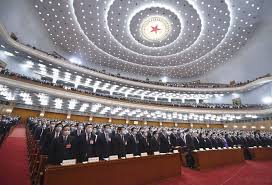Lawmakers at China’s annual legislative session

Beijing: Before sharing his stories in a live broadcast interview at the Great Hall of the People in Beijing, Luo Jie had been fighting COVID-19 on the front line for months in one of the hardest-hit areas in China.
The 53-year-old president of the Taihe Hospital in Shiyan, central China’s Hubei Province, is in Beijing attending the annual session of the 13th National People’s Congress (NPC), China’s national legislature, which opened on Friday.
Luo, an NPC deputy, is among about 3,000 national lawmakers and 2,000 political advisors gathering in the capital for the “two sessions,” a major political event that also includes the annual session of the country’s top political advisory body.
Though this year’s two sessions are shortened, lawmakers and political advisors still take questions from reporters on the sideline of the meetings, mostly via video links in light of the current COVID-19 epidemic situation.
Luo was joined by deputies from all walks of life — from primary-level community workers, janitors to lawyers and ministers. Their experiences offer a glimpse into how the country’s lawmakers fulfill their duties as NPC deputies.
Drawing on his professional experience, Luo offered suggestions concerning public health emergency responses.
Through arduous efforts, China has achieved decisive results in the fight against COVID-19. The novel coronavirus is dangerous, but frontline doctors and nurses went all out to save every single life, Luo said.
More than 3,600 COVID-19 patients aged over 80 have recovered in Hubei, seven of whom were centenarians, Luo told reporters. “We value every life with our whole heart.”
He also took advantage of the live broadcast to express his gratitude to those who have helped people in Hubei.
“Tens of millions of Hubei people will never forget those medical workers coming from across the country to save lives day and night, and we are grateful for every mask, every protective suit sent from around the world,” he said.
As epidemic prevention and control becomes a regular practice, China is making its final push toward poverty elimination and completing the building of a moderately prosperous society in all respects in this year.
The national endeavor to fight poverty is also a priority concern for Shi Liping, an NPC deputy of the Miao ethnic group in southwest China’s Guizhou Province.
A folk craftsman of the traditional Miao embroidery herself, Shi said the craft has created jobs for half a million Miao women.
Statistics show that Guizhou relocated 1.88 million people from inhospitable areas in 2019. “We have built 100 anti-poverty Miao embroidery workshops in the resettlement sites,” Shi said.
NPC deputy Zhu Guoping, a community worker in Shanghai, shared her experience of getting local residents involved to contribute to law revision.
“I made my cell phone number public to the residents and led my colleagues to make door-to-door visits to listen to their voices and help them solve problems,” Zhu said in front of the camera.
According to Zhu, her community has participated in the revision of 35 laws, including laws on domestic violence and minor protection, with 610 opinions brought forward.
On Friday, the national lawmakers started deliberating a draft civil code, which, after approval, is expected to further refine China’s basic legal system and rules of conduct in the civil and commercial fields.
In addition to a general provision and a supplementary provision, the 1,260-article draft has six parts on property, contracts, personality rights, marriage and family, inheritance, and tort liabilities.
The draft was prepared after extensive suggestions were solicited from the public. Xiao Shengfang, an NPC deputy and head of the Guangdong Lawyers Association, made 170 suggestions on revision since 2014 when the decision to compile the civil code was announced.
Considered “an encyclopedia on social life,” the civil code concerns every aspect of people’s lives, Xiao said. “I am glad that some of my contributions have been accepted.” Enditem





